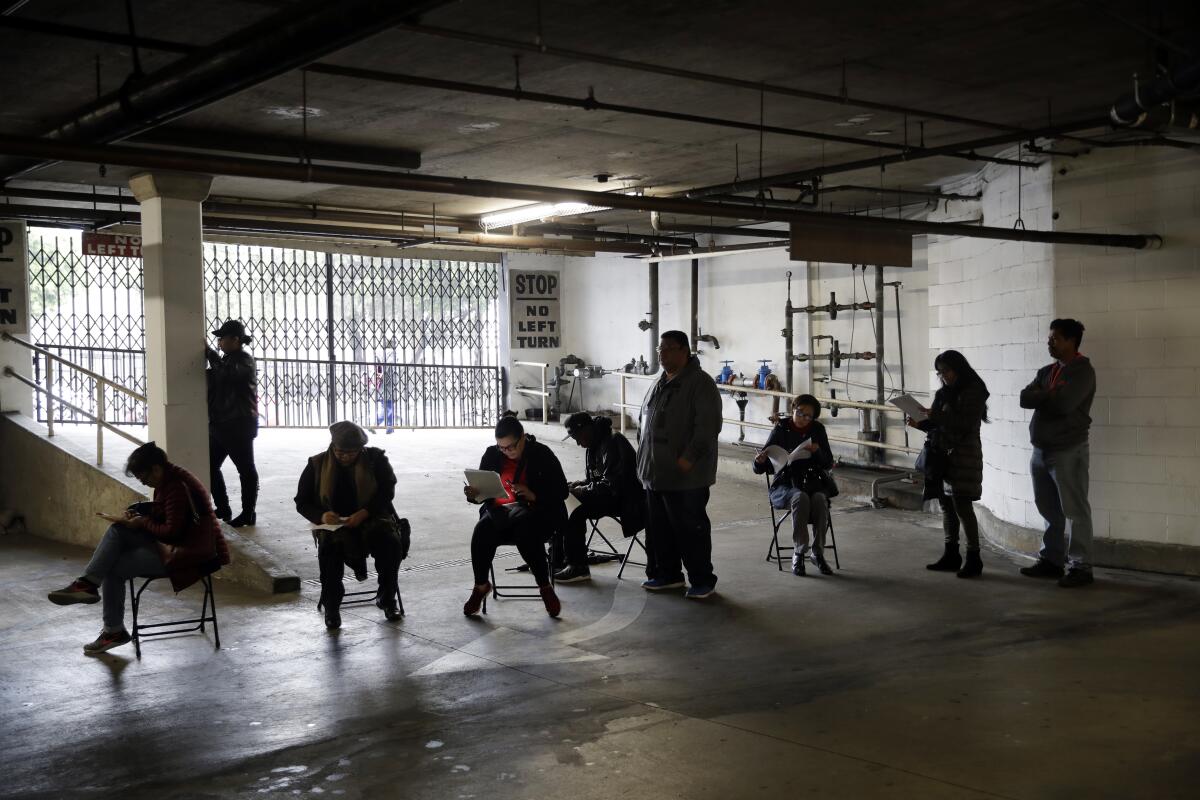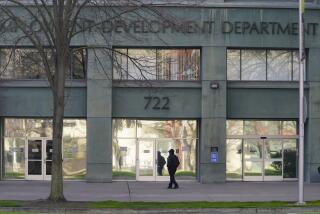Former California EDD worker faked being Dianne Feinstein in scamming jobless benefits, sources say

- Share via
SACRAMENTO — Federal authorities have filed charges in three newly uncovered conspiracies to cheat California’s pandemic unemployment benefits system, including one by a former Employment Development Department employee who was able to scam more than $200,000, including one claim that used the name of U.S. Sen. Dianne Feinstein.
Authorities Thursday said that former EDD employee Andrea M. Gervais allegedly participated in a mail fraud conspiracy in which she filed more than 100 false pandemic unemployment assistance claims using stolen personal information, including a successful effort paid in the name of Feinstein for $21,000.
“The senator’s office is aware that an individual used the senator’s name — along with multiple others — to file fraudulent unemployment claims,” said Tom Mentzer, a spokesman for the senator. “The matter will be handled by law enforcement and the courts.”
Court filings say that Gervais formerly worked for EDD from 2010 to 2018 as an office assistant under the name Andrea Dangerfield. Gervais was fired by the agency in October 2018 after an internal investigation implicated her in the theft of a money order, according to a request for a search warrant for her house and car presented to a federal judge on Dec. 11.
In that request, investigators allege that, in all, 12 claims totaling about $216,000 were paid by the agency, with proceeds sent to Gervais’ home in Roseville, a suburb of Sacramento. The benefits were from Pandemic Unemployment Assistance, a federally funded program authorized by the CARES Act to help gig workers, independent contractors and others.
“Unfortunately, these unemployment insurance benefits that were intended for Californians hit hardest by the ongoing COVID-19 pandemic shutdown have become the target of what may prove to be the largest fraud scheme ever perpetrated against the taxpayers in California history,” said McGregor Scott, U.S. attorney for the Eastern District of California, whose office is prosecuting the case. “This theft of taxpayer dollars intended to assist our citizens in a very difficult economic time simply will not be tolerated.”
The investigation began when fraud investigators with Bank of America, which handles benefits, discovered the Feinstein claim and became suspicious, according to source familiar with the investigation.
Bank investigators contacted the inspector general of the U.S. Department of Labor, revealing it had found 17 California unemployment profiles and one claim from Maryland, and had issued 21 prepaid benefits debit cards to those claimants, all going to the same Roseville mailing address as the claim for the senator.
Subsequently, the California EDD received a claim from Gervais in her own name, alleging that her hours as a shelf stocker at Goodwill Industries had been cut.
When authorities matched that address in Gervais’ personal claim with those of the suspect claims, investigators began watching her at the wood-sided duplex where the money had been sent. Roseville police had arrested Gervais in January on identity theft charges for allegedly obtaining a credit card under false pretenses, but subsequently dropped the charges for lack of evidence, the court filings said.
Investigators subsequently reviewed 44 ATM photos of Gervais using the Bank of America debit cards, including the card issued in the name of the senator. Gervais was arrested on Tuesday, federal authorities said, and was released on $50,000 bond Wednesday after appearing in federal court. If convicted, she could face a maximum of 20 years and a fine of $250,000 for each count.
Later in the day, in a separate case, a former contract worker with EDD from San Diego was charged in federal court with using her inside knowledge in processing claims to allegedly conspire with her boyfriend, who was in prison for murder, in a fraud scheme to steal hundreds of thousands of dollars in unemployment benefits.
Nyika Gomez, 40, of San Diego, was employed in July by an EDD contractor as a call center agent who helped individuals process their unemployment insurance. She was arrested after investigators alleged she conspired with her boyfriend, a prisoner serving a term of 94 years to life at California State Prison, Sacramento, for murder.
Gomez allegedly obtained personal identifying information from California prisoners with help from her boyfriend, as well as stolen personal information on out-of-state residents, that she allegedly used to file fraudulent unemployment claims.
The arrests come a week after Bank of America, which provides EDD debit cards with unemployment benefits, estimated fraud may be as much as $2 billion in California after it identified 640,000 suspicious claims.
State officials estimated recently that about $400 million in fraudulent claims have been filed in the names of prison inmates.
Fraud involving EDD employees has been an ongoing problem at the agency.
The EDD has seen 16 former employees convicted of fraud over the last 10 years, said Loree Levy, a spokeswoman for the agency.
Most recently, authorities announced in March that a former EDD tax compliance representative had been sentenced to six years in prison for conspiring with five other people to obtain $887,199 in California unemployment benefits based on fraudulent claims.
“The EDD is committed to combating the aggressive fraud attacks against the unemployment benefit system and is grateful for the collaborative efforts of federal, state and local partners in this shared goal,” said Nancy Farias, an EDD chief deputy director, on Thursday.
Some district attorneys and investigators say that top California leaders are not doing enough to stop unemployment fraud, even after abuses of EDD jobless benefits were exposed.
A state task force investigating fraud in the prison system is trying to determine whether any of the bogus EDD claims were inside jobs involving employees, said Brian Ferguson, a spokesman for the California Governor’s Office of Emergency Services, which is overseeing a task force investigating the prison fraud.
“The scope of the task force’s investigative work does include determining who was involved, including, but not limited to, state employees,” Ferguson said.
Separately on Thursday, a federal grand jury in Fresno returned an indictment against two women, Sholanda Thomas, 36, and Christina Smith, 37, for mail fraud and identity theft related to filing false unemployment claims involving prisoners at the Central California Women’s Facility in Chowchilla.
Authorities allege that after Smith was paroled recently, she worked with Thomas, who is still incarcerated, to file illegal claims on behalf of other women at the prison. The false claims netted more than $200,000, according to a source familiar with the investigation. The scheme came to light through review of recorded phone calls between the women.
Prosecutors allege Smith used part of her proceeds to pay for plastic surgery and kept Thomas’ share in a shoebox pending her release.
In many of the applications, the claimants said they were hair stylists or barbers who were unable to find work. Those familiar with the fraudulent claims coming out of California prisons said those two jobs have been prevalent in applications because they can be difficult for the state agency to verify.
Scott, the U.S. attorney, said that other cases are being investigated, and that federal, state and local agencies are working together on a single task force to streamline those efforts.
More to Read
Sign up for Essential California
The most important California stories and recommendations in your inbox every morning.
You may occasionally receive promotional content from the Los Angeles Times.











